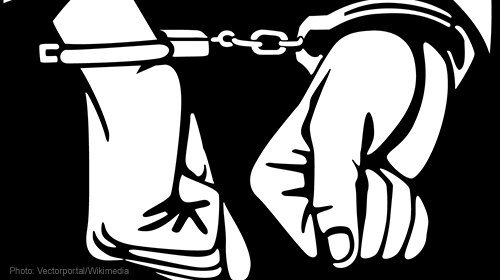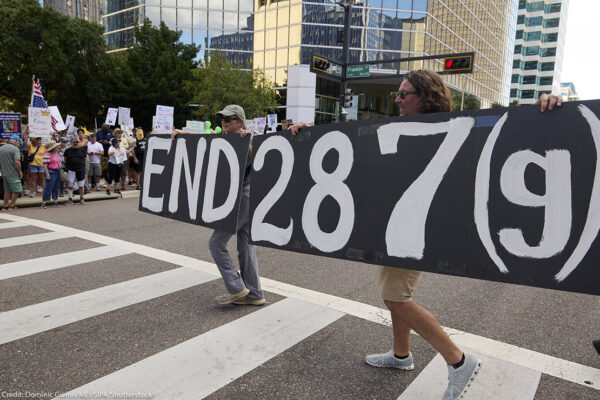
Imagine a courtroom where the accused face a judge 50 at a time. They are handcuffed, and their feet are chained together. The judge calls them before the bench in groups of eight to face the charges. His message to the group: either plead guilty to a misdemeanor, or face felony charges and a federal prison sentence of up to 20 years. Not surprisingly, every one in the group accepts the guilty plea, without argument.
That's the chilling scene I witnessed earlier this month in a courtroom in Tucson, Arizona. It's the kind of assembly-line justice that might be expected in the gulag prison system of Egypt's military-backed government. But this is now the way American "justice" is being meted out in courthouses across the Southwest. It's called "Operation Streamline," an effort begun under the Bush Administration for mass criminal prosecution of immigrants who have dared to cross the US border without papers.
The day a group of ACLU staffers and I attended the Tucson court hearing, it was a blazing 106 degrees outside. Almost all the defendants had been apprehended by Border Patrol agents during the sweltering heat of the previous few days. They still wore the soiled clothes of their journey, and a pungent reminder of the desert crossing permeated the courtroom. Observing their somber faces, I could only imagine the perils they had faced in their desperate trek north: thirst, hunger and the ever present danger of outlaws and cartel members who prey on migrants.
The 50 men were packed shoulder to shoulder on courtroom benches, a look of resignation on their faces. When the judge called out their names one by one, they each answered "Presente!" in a cascading chorus of Spanish. Then the mass processing began. As each group of eight moved to the bench — along with the court-appointed attorneys they had met only a few hours earlier — the sound of their clanking chains echoed through the room.
In a feeble nod towards due process, the judge read the group a list of rights they would give up if they accepted the plea bargain offered by federal prosecutors. He spoke in a monotone, uttering the words he must repeat hundreds of times every month: Do you understand you give up your right to a jury trial? Your right to appeal? Do you understand the charges against you? After each question, the group answered in unison, "Si" — an improbable affirmation, I thought, given that these men from Mexico and Central America probably had little understanding of their rights.
It took less than ten minutes for the judge to process and sentence the first group. After each man pleaded guilty, he was given a jail term of anywhere from one to six months, many of them to be housed in private prisons at taxpayer expense. After serving their sentences, they face almost certain deportation, and will be marked as even more "serious" criminals if they are caught crossing the border again.
This disturbing scene of mass injustice is repeated every day in border states. In Tucson alone, up to 70 people are shunted through Operation Streamline daily. More than 80% of the criminal cases filed in Arizona federal courts last year were prosecutions for unauthorized border crossings.
After attending the proceedings, our group met with Grant Bashore, a federal criminal defense attorney who has represented Streamline defendants in the past. He calls it a "dumping ground" that criminalizes migrants. He says that every morning public defenders or court-appointed private attorneys are assigned five to eight cases each to handle that day. Each defendant then gets a mere 30 to 40 minutes to speak with a lawyer before facing a judge. There's no opportunity to make arguments about an individual's circumstances or reasons for coming to the U.S. —reasons that might include reuniting with U.S. born children or seeking asylum — because the Streamline machine doesn't consider these factors. Bashore and other attorneys say they have even seen U.S. citizens mistakenly getting caught up in this justice mill.
Operation Streamline persists on the theory that the threat of criminal prosecution will deter migrants from undertaking the dangerous journey across the Sonoran desert. But there's no evidence that criminalizing unauthorized immigration is a more effective deterrent than civil proceedings – the government's usual approach to the issue before Streamline was invented. American taxpayers foot the bill – estimated to be as much as $1 billion annually - for this travesty of justice, with hundreds of millions of those dollars flowing to private prison companies. This fast-track justice system also raises serious questions about whether the power and resources of our federal courts should be used to criminalize people for fleeing violence and poverty in their homelands or seeking to reunite with family members in the U.S.
For more on Streamline, see ACLU's recommendations here.
Learn more about immigration reform and other civil liberties issues: Sign up for breaking news alerts, follow us on Twitter, and like us on Facebook.



